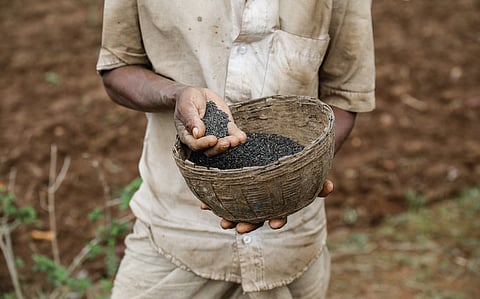A community seed bank is a tool to make farmers and farmer–led organisations stronger and self–reliant
Beej Bachao Andolan is a non–formal group of farmers and activists working to conserve traditional seeds, crops, and farming practices.
The movement, which was started in 1980’s, remains unregistered by choice, does not take any external funding, and places small farmers at the center of its vision. We have met three major milestones. First, at a time when traditional seeds and farming practices were being abandoned, the movement helped bring back respect and recognition for them. Today, the conservation of local seeds is widely accepted, and the early efforts of the movement stand vindicated. Second, Beej Bachao Andolan has preserved and shared hundreds of varieties of local grains, millets, pulses, oilseeds, and spices through free exchange, encouraging farmers to save and share seeds at the community level. Third, the movement has revived the traditional Barahnaja system, a mixed farming method where twelve or more crops, which had nearly disappeared under the pressure of commercial agriculture, are grown together.
A community seed bank is a tool to make farmers and farmer–led organisations stronger and self–reliant. In the Himalayan region, agriculture is deeply rooted in culture, and every farmer traditionally maintains independent seed stores, which in the local language is called, “Bijunda”. The containers for bijunda are made from wood, bamboo, clay or mud, and also tin. There are different traditional methods for safely storing seeds in the bijunda. We have made numerous ground level efforts to preserve and sustain this culture of seed storage.
Farmers have long known that sowing the same type of seeds repeatedly in the same field leads to seed deterioration and reduced yield. That’s why farmers collectively practice seed exchange, allowing them to introduce new seed varieties into their fields. This not only increases yield but also turns seeds into community wealth, 36 fostering collective responsibility. Before harvesting the crop, farmers identify the best–yielding portion of the field. This selected part is marked. Women farmers are especially involved in this process. They remove weeds and weak stalks and choose only the strongest ones for seed.
This process of seed selection is called ‘Rotiyaana’. The part of the crop chosen for seed is harvested, threshed, and dried separately. After that, traditional purifying substances like ash, cow urine, or pest–repellent herbs are used for purification before storing the seeds in bijunda. Each crop has a different method of storage. These bijundas are independent seed banks found in different farmer households, but the seeds stored are considered community property. Today, in every village and community, self–help groups and collective organisations are forming CSBs. These organisations need to understand the post–Green Revolution crisis in agriculture and seed systems.
It is crucial to raise awareness among farmers about the problems caused by chemical farming to humans, animals, and the environment. One major challenge is to sensitise farmers and ensure official recognition for community–based seed banks in government agriculture policies.
Another major challenge is for the government and agriculture departments to provide the necessary resources such as wooden, mud, and bamboo containers and proper infrastructure for seed storage. Progressive farmers who cultivate and conserve seeds should be recognised under national seed laws. If some farmers can create self–reliant resources through their own SHGs, it will be even more beneficial.
The Beej Bachao Andolan has successfully established seed banks with nearly 400 varieties of rice, maize, sorghum, nutritious grains (millets), pulses, and oilseeds without using external resources.
Private seed banks are living banks. They must be grown every season to stay alive. They are not like financial banks for deposits or like gene banks for cold storage, they are directly connected to cultivation and harvest. These banks are not used for hybrid seeds.
In times of climate crisis like droughts, floods, and other natural calamities, community seed banks not only provide food security but also ensure nutrition, because the seeds stored are tailored to the community’s actual needs. Experience shows that millet seeds and other traditional crops endure drought and flood conditions and still provide food and nutrition security. For instance, during the 1986-87 and 2009 droughts in Uttarakhand, the yield of nutritious millet crops like ramdana (amaranth), mandwa (finger millet), and jhangora (barnyard millet) did not decline.
The bijunda is the farmer’s personal seed bank and this puts protection in their own hands. All the seeds they need for any season are available at home. It is a sign of self-reliance, especially when rains are erratic. It is unaffected by inflation. It runs without capital or the need for bank loans. It is a resilient seed bank.
In his writings on the Himalayan region, British officer George Francklin Atkinson described the historical famine of 1852, also known as Bavani ka Akal in Garhwal. He wrote that, ‘a mountain farmer would die, but never eat from his stored seeds.’ During the famine, when his team visited villages, they found dead bodies yet inside the homes, the bijunda were untouched and safe. People chose death over consuming their seeds, knowing that the seeds were vital for future generations.
A popular Garhwali saying goes: Khaja khand aur beejdharan (Eat the grain from the harvest but always save the seed.) Indeed, seeds are nature’s valuable property, and just like human lineage, the seed lineage must also continue.
This was originally published as part of Celebrating community seed banks of India: Conversations on climate-resilient seeds
Vijay Jardhari Founder, Beej Bachao Andolan (Save the Seeds Movement), Uttarakhand

